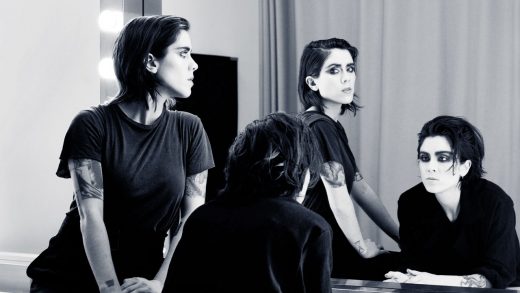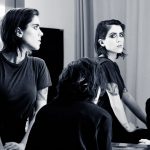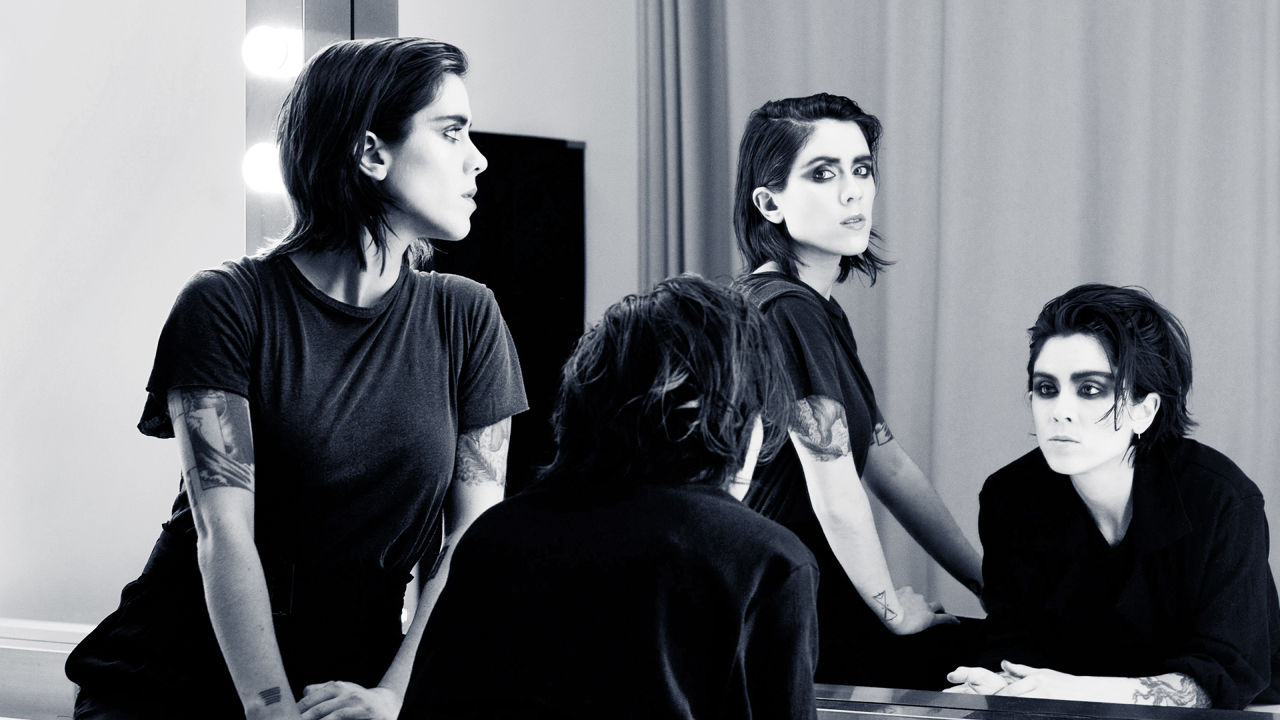“Let’s Never Do That Again”: Tegan And Sara On 20 Years Of Taking Risks
With their eighth studio album, Love You to Death, arriving this week, Tegan and Sara continue to hone their ability to pack infectious hooks, sweet harmonies, and a gentle defiance of critics and boundaries to near perfection.
The Canadian pop duo is indeed doing their own thing after nearly two decades in the business, and they couldn’t be happier. Look underneath their slick production—the choruses that beg to be sung along with, the tracks that make you want to dance, to kiss someone, to emancipate yourself from other peoples’ expectations—and something like a mission statement emerges.
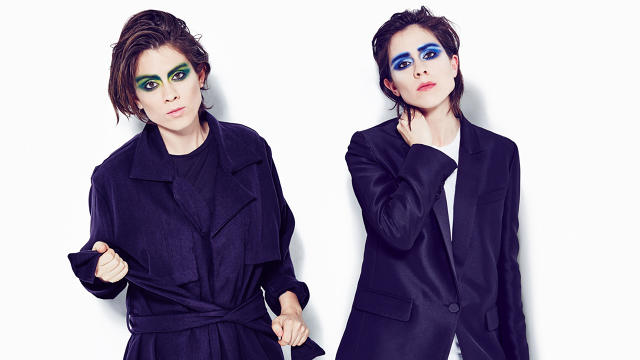
All About Risk
Sustaining any creative endeavor over the long run comes down to an imprecise amalgam of luck, experimentation, and reinvention. When they spoke with Co.Create about the new record and the creative process they’ve refined over the past 20-some years, Tegan and Sara (identical twins born Tegan Rain Quin and Sara Keirsten Quin in Calgary, Alberta) make it clear how intrinsic those last two elements are to their sound and image—whether performing with the likes of Taylor Swift and Katy Perry or recording the purposefully earworm theme song to 2014’s The Lego Movie.
“We wanted to make sure we were still taking risks,” explains Tegan. “There’s always the chance when you get to this stage in your career— whenever you’ve been successful at something—to just try to keep repeating it. When something is successful for us, we’re kind of like, great! Let’s never do that again.”
She points to the group’s 2013 record Heartthrob and now to Love You to Death—with songs like “BWU” that question the conventions of marriage and “Hang on to the Night,” a reflection on anxiety—as evidence that “it’s a new era for Tegan and Sara. It’s acknowledging that we’ve truly grown up. We’ve gotten our PhD, and now we’re going out into the world.”
They’re certainly doing so in a literal sense. The band, which has sold more than 1 million albums over their career, heads out on the road for a 41-date North American tour this fall, and both Tegan and Sara profess an excitement about road testing some of the new material. Touring is, of course, as much an attendant function of putting new music into the world as are the demands that accompany the branding of a band. And the sisters take their brand as seriously as their music—including things like a special line of merchandise they worked on for months to accompany the new record. The line, created with longtime creative director Emy Storey and sold alongside album preorders, includes limited-edition silkscreen posters with personalized autographs, hats, watches, and more.
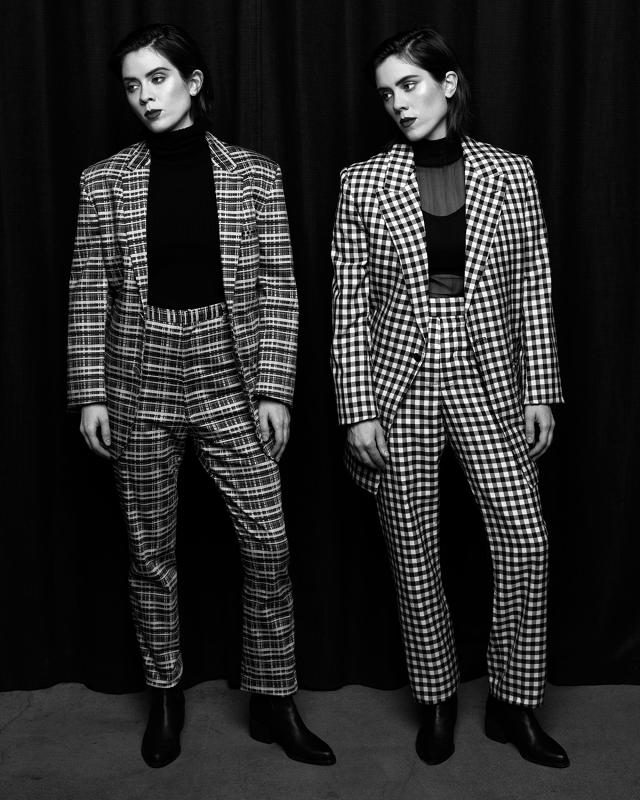
Traversing A New Landscape
Meanwhile, the world the sisters are going back out into has also changed considerably. Correspondingly, their songs are even more specific this time around and also include the group’s first direct references to same-sex relationships.
“One of our new songs [“BWU”] is a bit of a commentary on the institution of marriage and my disinterest in it,” explains Sara. “I’m interested in the reaction to that from the fan base. Given the recent escalation of LGBT rights, I think it might come as a surprise—that once it’s legal for gay people to get married, my first reaction is to write a song that says, well, maybe I don’t want that . . . I’ve also been thinking a lot about what makes music serious and what makes people take it seriously. It’s amazing how a certain production can make people think a song doesn’t have substance. Like, why is the new Radiohead record so cerebral and taken so seriously, and then with Taylor Swift and 1989, people just automatically assume it’s not as serious.”
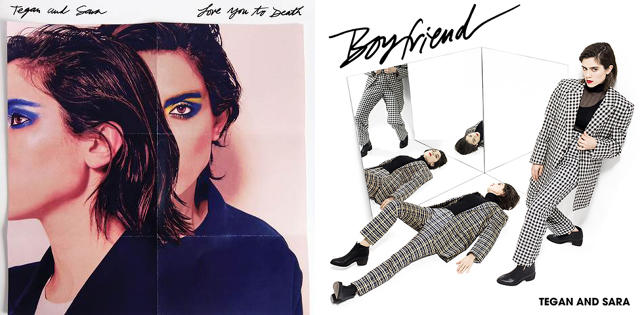
Ironically, pop seems to have brought them both to a kind of incongruous place. Tegan and Sara today are more successful than ever, while still relishing a bit of the outsider status that’s a result of being who they’ve always wanted to be, in an industry with a power structure that seems to naturally bend toward contrivances and showmanship.
“Our industry is still male dominated and heteronormative,” says Tegan. “I think we were always outsiders in indie rock, because we really were different—I think being queer really made us stand out. Transitioning into the pop world, I feel more accepted and confident. I take a lot of comfort from our audience, because we represent them, and they sometimes feel like ‘others’ as well. But things have changed. The world has changed. I also think there’s always someone younger and cooler and more relevant coming along. I think that’s why we work so hard and are constantly trying to reinvent ourselves.”
That “hard work” is a reference to the structured approach to songwriting and creativity in general that Tegan and Sara have settled on.
Other bands and songwriters might prefer a let-it-come-when-it-comes approach. The sisters, however, are fastidious about grinding it out—being purposeful about writing, about collaborating, about regularity in their hours and their surroundings. It’s an approach they say has been pretty consistent, up through Love You to Death.
“It’s a muscle, and you have to work it every day,” Tegan says. “I feel that way about music—whether I’m playing guitar, or working on new music, I participate in music almost every single day of the week. I think the ability to keep it going this long came from an almost sort of—I don’t want to say that it’s, it’s not discipline, but it kind of is. Sit down every day and do it. Talk about it. Feel it. Play, write, create, tour. I feel like it’s work, and you have to just put your 10,000 hours into it.”
“I think we also admitted very early on that it’s a business. It’s how I make a living, and I’m proud of that. I get every T-shirt sample sent to my house. I look over every single word written about us that comes from our label. We care about every detail. It still matters to me as much as it did 20 years ago.”
The Magic Of “No”
The flipside of that proclivity for work and creation, she goes on, is getting more comfortable with saying no and being aware of overextension. It’s about learning to listen to yourself, she says, so that she can hopefully head off the times when she and Sara have been drained, didn’t want to tour, didn’t feel creative and weren’t feeling it onstage.
It was harder to do in their 20s, she says, because you’re not as certain then about your trajectory.
“I’m not one of those people who have to work through the night or go to a deserted island,” says Sara about her creative process. “I actually feel like sometimes my process is incredibly disciplined and structured, and it’s when that disappears that I don’t feel very creative. I have a structure to my day. I’ll do the same thing every day the same way. I get up at the same time, have the same routine every morning. Over this past year, my process was once my girlfriend left to go to work, I’d do a mad dash around the house, cleaning and organizing. I wouldn’t allow myself to go into the studio until I’d removed all the clutter. That’s necessary to unblock myself creatively. I can really be deeply impacted by the environment around me. Tegan and I need a very uncluttered environment.
“To me, creativity is not some mystery. It’s not. To me, it’s just hard work. It’s sitting down and brainstorming ideas. Sometimes I’ll work eight or nine hours on an instrumental and wake up the next day and come down and listen to it. Sometimes say, okay, this next stage will be the lyrics, and sometimes scrap it and start over. For me, it’s just relentless, hour after hour, work.”
Fast Company , Read Full Story
(36)

